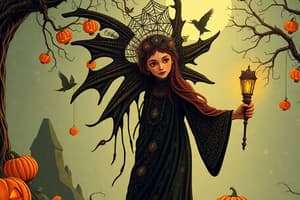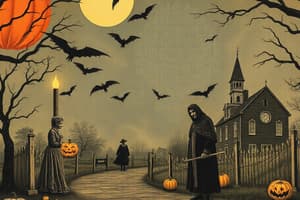Podcast
Questions and Answers
What significant change did Pope Gregory III implement regarding October 31?
What significant change did Pope Gregory III implement regarding October 31?
- He established Halloween as a national holiday.
- He required all to wear costumes on October 31.
- He designated November 1 for honoring all saints. (correct)
- He banned the celebration of Samhain.
How did the Celts primarily celebrate the festival of Samhain?
How did the Celts primarily celebrate the festival of Samhain?
- By decorating their homes with pumpkins.
- By having community feasts with foods from the harvest.
- By offering gifts to the spirits of the dead.
- By lighting bonfires and wearing costumes. (correct)
What did the Celts believe about the night before their new year?
What did the Celts believe about the night before their new year?
- It was a time for celebration only.
- The boundary between the living and dead was blurred. (correct)
- It was when the winter solstice occurred.
- It signified the end of the harvest season.
What was a common practice of the Druids during the celebration of Samhain?
What was a common practice of the Druids during the celebration of Samhain?
What was believed to happen when the Celts celebrated Samhain?
What was believed to happen when the Celts celebrated Samhain?
What role did the Roman Empire play in the history of Halloween?
What role did the Roman Empire play in the history of Halloween?
What did the Celts do with their hearth fires during the celebration of Samhain?
What did the Celts do with their hearth fires during the celebration of Samhain?
What did the Celts typically wear during the festival of Samhain?
What did the Celts typically wear during the festival of Samhain?
What does the Roman goddess Pomona symbolize?
What does the Roman goddess Pomona symbolize?
What was the significance of May 13, 609, in relation to All Saints' Day?
What was the significance of May 13, 609, in relation to All Saints' Day?
How did the Christian church's All Souls’ Day relate to Celtic traditions?
How did the Christian church's All Souls’ Day relate to Celtic traditions?
What does 'All-Hallows Eve' refer to?
What does 'All-Hallows Eve' refer to?
Which of the following customs did colonial Americans include in their Halloween celebrations?
Which of the following customs did colonial Americans include in their Halloween celebrations?
In which regions of America was Halloween more commonly recognized during colonial times?
In which regions of America was Halloween more commonly recognized during colonial times?
What festival was observed on November 1 before it evolved into All Saints’ Day?
What festival was observed on November 1 before it evolved into All Saints’ Day?
Which holiday later became associated with Halloween due to its timing and themes?
Which holiday later became associated with Halloween due to its timing and themes?
Flashcards are hidden until you start studying
Study Notes
Halloween Origins
- Halloween originated from the ancient Celtic festival of Samhain (pronounced sow-in) celebrated on October 31st.
- Celts, who lived 2,000 years ago in Ireland, the UK and northern France, marked the end of summer and the harvest and the beginning of their new year.
- They believed on the night before the new year, the boundary between the worlds of the living and the dead blurred.
- Celts celebrated Samhain to honor the dead, avoid bad luck, and gain insight into the future from the powerful spirits.
- They built bonfires as sacrifices to their deities, wore animal costumes and attempted to tell each other's fortunes.
Halloween and the Catholic Church
- In the 8th century, Pope Gregory III established November 1st as a time to honor all saints, called All Saints Day.
- This later incorporated some of the traditions of Samhain.
- The evening before All Saints Day was called All Hallows Eve and later shortened to Halloween.
Halloween in America
- Colonial New England had limited Halloween celebrations due to Protestant beliefs, but Maryland and southern colonies embraced the holiday.
- Immigrants from Europe and interaction with Native Americans shaped a distinct American version of Halloween.
- American Halloween included "play parties" where people shared ghost stories, told fortunes, danced and sang.
- By the mid-19th century, Halloween celebrations became more common but were not celebrated everywhere.
- In the late 19th century, immigrants from Ireland, Scotland and Germany brought their traditions, including trick-or-treating, carving jack-o-lanterns, and wearing costumes.
Studying That Suits You
Use AI to generate personalized quizzes and flashcards to suit your learning preferences.



